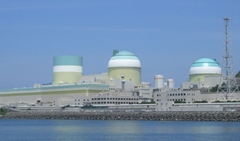Canada to raise nuclear liability cap from $75 mn to $1 bn
11 Jun 2013
Canada's Harper government is set to increase the liability of the nuclear industry to $1 billion from $75 million after introducing a new legislation to replace the 40-year old regulation in force now.
 While addressing the annual conference of the Canadian Nuclear Society yesterday, the federal minister for natural resources Joe Olivier said, ''Nuclear energy continues to be a key part of Canada's energy mix and a major contributor to our status as a world leader in clean electricity."
While addressing the annual conference of the Canadian Nuclear Society yesterday, the federal minister for natural resources Joe Olivier said, ''Nuclear energy continues to be a key part of Canada's energy mix and a major contributor to our status as a world leader in clean electricity."
"Our government is committed to a strong and sustainable nuclear industry. We will bring forward legislation in the coming months to strengthen Canada's nuclear liability regime above most international standards," Olivier further stated.
The old liability cap of $75 million is now regarded as being too meagre following the Fukushima nuclear disaster in Japan in 2011, where nuclear liability claims mounted to tens of billions of dollars.
Apart from raising the liability cap to $1 billion, the new legislation will broaden the number of categories for which compensation may be sought and improve the procedures for delivering compensation.
The minister also said that by joining the International Atomic Energy Agency (IAEA's) convention on supplementary compensation for nuclear damage, the country will bolster total potential compensation up to $1.45 billion, by bringing in additional funding to the tune of $450 million.
The proposed legislation is expected to be put before the parliament in the fall of 2013.
Canada's nuclear industry generates about $5 billion in annual revenues and provides employment for approximately 17,000 people while uranium mining accounts for over $1 billion in annual exports employing around 5,000 people.
"Our government is actively addressing important issues for the nuclear sector, including: ensuring a strong regulator, responsibly managing legacy wastes, restructuring Atomic Energy of Canada Limited and facilitating international trade opportunities" Olivier said.
There were several failed attempts in the past to increase the liability cap to $650 million, although the international norms have been changed after the Fukushima disaster.
Environmentalists demand unlimited liability, saying that anything less could act as a subsidy to the nuclear industry. Some argue that limiting the liability would be incentive for a company involved in an accident to declare bankruptcy and walk away, leaving the responsibility to the government.
It is believed that Canada's nuclear operators are not opposed to raising the limit and discussions are ongoing how to create a substantial insurance fund without affecting their bottom lines.
Global environmental agency Greenpeace has severely criticised the government for failing to consult beyond the industry for the new legislation, condemning the minister's announcement.
''A key lesson of the Fukushima disaster is we need to make all nuclear companies responsible for the risks they create,'' Greenpeace said.
The Fukushima disaster on 11 March 2011 caused the evacuation of over 100,000 people and left many families and businesses bankrupt in its wake.
According the Nuclear Energy Agency, about $18 billion has been paid in compensation for damages attributable to the accident as of November 2012, and these figures are subject to change as time progresses.


















